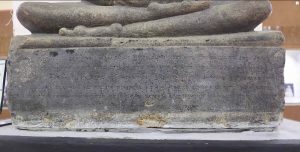Note: This translation deals only with the Sanskrit verses. The Pyu glosses are not translated here; the possible meanings of the glosses are discussed in Griffiths et al. 2017, pp. 107–140.
[I]
‘[He], by whom, after considering (or: meting out punishment) … from this time onward (? itaḥ) … the future …, this Pair of Cities was in a single day made into a singular cause of the cessation of strife between kings of prominent valor and majesty:
[II]
‘after prostrating to him, named Ārya Guhādhipa, who … the influxes (āsrava), who teaches what is singularly beneficial for the Pair of Cities, who attains the excellent concentration (samādhi) which is conducive to compassion,’
[III]
‘this [ordinance], marked on the stool of his (Guhādhipa’s) excellent lotus feet, [in favor] of a policy of agreement (kriyākāra–naya) [has been made] by [me], king Śrī Jaya Candravarman. From the moment (that this had been done) for the elevation of …,’
[IV]
‘from that very point onward, having fully adopted [this] resolve, I must no longer engage with my younger brother Śrī Harivikrama in conflict, that hurts [our] feeling of affection for each other.’
[V]
‘And again, whatever descendants will be born from us (i.e., me), coming down in a lineage of succession including sons, they will not contend with your descendants, coming down in a lineage of succession including sons.’
[VI]
‘Those who practice this ordinance (vidhi) transmitted along the path of good conduct (or: of those of good conduct), in order not to be reborn as a snake, let them all be healthy, long-lived, always successful in their achievements due to the arising of … .’
[VII]
‘Those by whom this range of action for the noble is transgressed, let them be perturbed by the tasks of war, their bodies afflicted by incessant disease, their success always fettered from the beginning.’
[VIII]
‘This policy of agreement as well as (tathaiva) mutual friendship is always followed up also by [my] dear younger brother (anuja), together with those (i.e., our) younger brothers following one another in a succession of families of sons, as long as the earth remains.’

